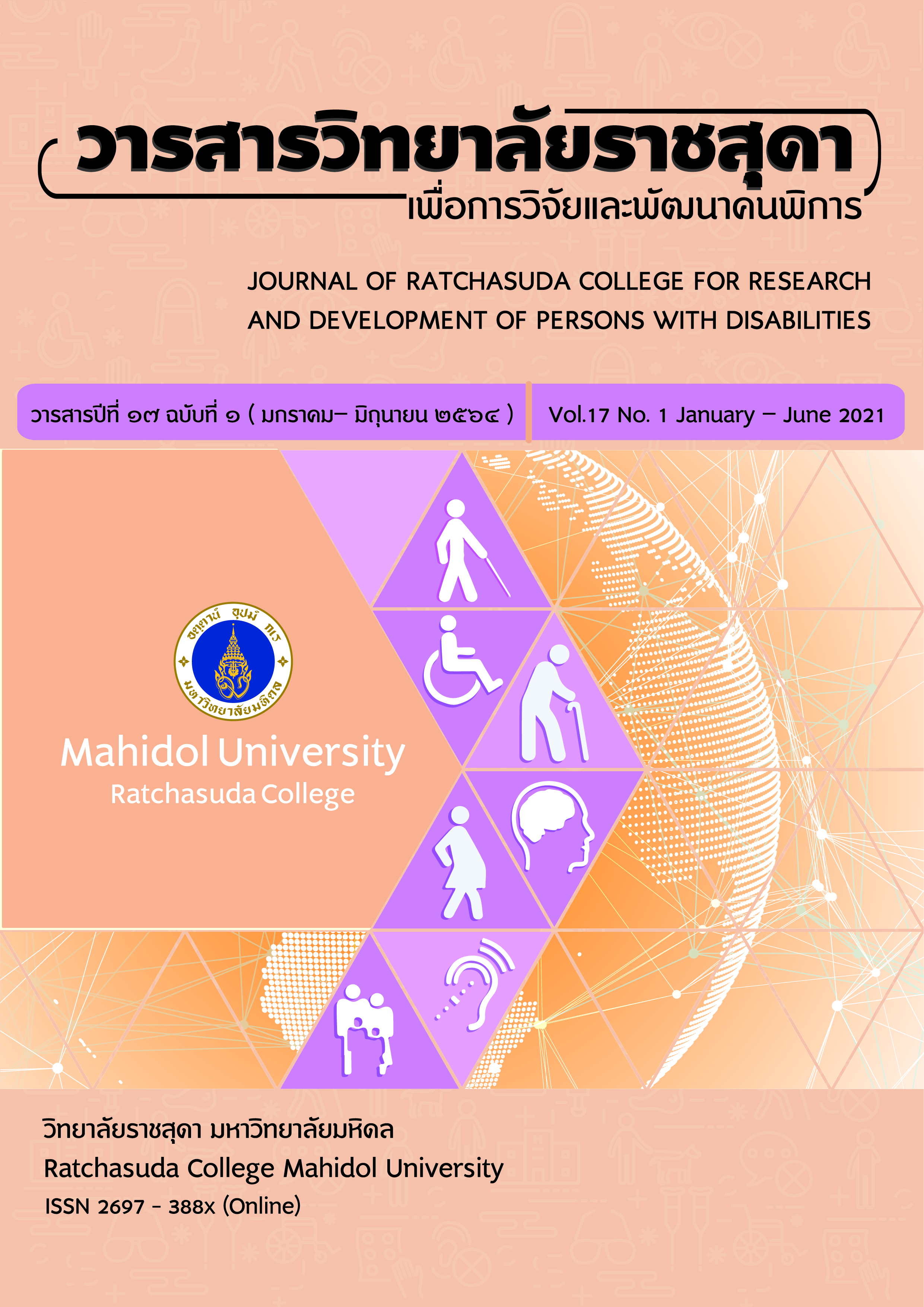THE EFFECT OF SELF-HELP GROUP PROGRAM FOR CAREGIVERS ON AGGRESSIVE BEHAVIOR MANAGEMENT IN SCHOOL-AGE CHILDREN WITH LEARNING DISABILITIES
Keywords:
The Effect of self-help group for caregivers, Primary caregivers of school-aged children with learning disabilities, Aggressive behavior management in school-aged children with learning disabilitiesAbstract
The purpose of this quasi-experimental research is to study the effect of a self - help group program for caregivers on aggressive behavioral management in school-aged children with learning disabilities at Ubonwittayakhom School, Ubonratchathani Province. A specific sample was selected which was the primary caregiver of school-aged children with learning disabilities that are 25 students who were studying in primary 1 to 6 at Ubonwittayakom School at Ubonratchathani Province. self-help group program tools were used in this experiment and The tools used for data collection were personal data questionnaires and questionnaires for managing aggressive behavior in school-aged children with learning disabilities. The research was carrying out self-help group program activities between September-December 2019, 5 times 1-2 times a month, each time taking 2 weeks apart for a total of 4 consecutive months. The statistics used for data analysis were descriptive statistics and paired t-test. The results showed that the primary caregivers of school-aged children with learning disabilities and a self-help group has the higher mean score of ability to manage aggressive behavior of school-aged children with learning disabilities than before joining the program (p<.001). In addition, it was found that the primary caregivers of school-aged children with learning disabilities had their knowledge increased and aggressive behavior management in school-age children with learning disabilities.
Downloads
References
book center; 104 p.
Bowen, L. M. (2005). Intervention strategies for LD students. Illinois: Illinois state university.
Broidy, LM., Tremblay, RE., Brame, B. & et al. (2003). Developmental trajectories of childhood
disruptive behaviors and adolescent delinquency: A six-site, cross-national study.
Developmental psychology; 39(2): 222–45.
Burns, N. & Grove, S.K. (1997). The practice of nursing research: Conduct critique & utilization
(3thed). Pensylvania: Saunders.
Cantwell, D. P. & Baker, L. (1991). Association between attention deficit-hyperactivity disorder
and learning disabilities. Journal of learning disabilities; 24(2), 88-95.
Chien, W. & Chan, S. (2013). The effectiveness of mutual support group intervention for chinese
families of people with schizophrenia: A randomized controlled trial with 24-month
follow-up. International Journal of nursing studies; 50(5): 1326-1340.
Donald, K. R. (1979). Activity, attention, and aggression in learning disabled children. Journal of
clinical child psychology; 8(3): 183-187.
Frisch, N. C. & Frisch, L. E. (2002). Psychiatric mental health nursing (2nd ed.). Albany, NY:
Delmar/Thomas learning, Inc.
Iamsupasit, S. (2013). Theories and techniques for behavior modification (Theories and
techniques in behavior modification) 8th edition, Bangkok. The publisher of chulalongkorn university.
Kalaya. P. (2016). The effect of aggressive behavior management program. Degree thesis master.
Chulalongkorn university 2016.
Khamlieng, K. (2013). Textbook on basic health education 6, Grade 6, Bangkok: Imphan
publishing.
Liangpanich, P., Somprasert, C. & Imakham, E. (2018). The effects of peer support program on
the fellow of the psychosocial rehabilitation ability of schizophrenic patients of caregivers. Journal of the royal thai army nurses; 19 (Special january-april 2018): 214-223.
Office of special education administration. (2009). Notification of the ministry of education on
the type and criteria for educational persons with disabilities. Bangkok: Ministry of education.
Phupaibun, R. (1998). Family nursing: Concepts, Theory and implementation = Family nursing:
theoretical perspectives and application. 3rd edition (revised version). Bangkok: Textbook project, Department of nursing. Faculty of medicine, Ramathibodi hospital mahidol university, 251 p.
Rashidi, K., Safavi, M. & et al. (2015). Effects of self-help programs on peer support of type 2
diabetic patients. Scientific journal of hamadan nursing & midwifery faculty; 23(3), 1-12.
Saksiriphon, D. (2012). Development of the ability to read and write words that are spelled
exactly according to the student's section, Grade 1-3 with learning disabilities using P-Lips. Bangkok: Department of special education. Faculty of education srinakharinwirot university.
Sornphaisan, S. (2010). Thamma leela therapy book. Bangkok: Bureau of alternative medicine,
ministry of public health.
Piyasilpa, V. & Katumarn, P. (2007). Child and adolescent psychiatry. Bangkok: Beyond-enterprise;
2007.
Sungprasit, M. & et al. (2012). Learning disability disease. Office of the department of psychiatry
(General administration and administration), Department of psychiatry faculty of medicine, Ramathibodi hospital mahidol university.
Tagpho, T., Somprasert, C. & Imakham, E. (2017). The effects of a self-help group program on
the mental health self-care of schizophrenic patients’ primary caregivers. Journal of
nursing and health care; 35(3): 109-119.
Thanikkul, B., & Dangdomyouth, P. (2012). The effect of self-help-group and empowerment on
Burden of caregivers of schizophrenic patients in community. The Journal of Psychiatric Nursing and Mental Health; 26(2), 74-86.
Tiengsomboon, U. & seedam, P. (2012). The study of aggressive behavior in school-age children
with learning disabilities. An academic conference under the participation in educational management Program to promote the well-being of children with special needs in Ubon wittayakhom school, Ubonratchathani province, May 19, 2020.
Thongsirat, T. (2014). Information technology for children with special needs. journal pediatrics;
53(2): 80-88.
Tremblay, R. E. (2008). Anger and aggression. Infant M. Haith & J. Benson (Eds.), Encyclopedia of
infant and early childhood development. 2nd ed. New York: Academic press.
Walz, G. & Bleue, C. (1992). Developing support groups for students: helping students cope with
crises. Michigan: ERIC.
Wiwattanawongsa, W. (2018). Aggression/Violence in child & adolescence. Retrieved May, 14,
2020, from http://www.srithanya.go.th/srithanya/files/YOUTH/Aggression_update2018.pdf.
Downloads
Published
How to Cite
Issue
Section
License
บทความที่ได้รับการตีพิมพ์เป็นลิขสิทธิ์ของวารสารสถาบันราชสุดาเพื่อการวิจัยและพัฒนาคนพิการ






